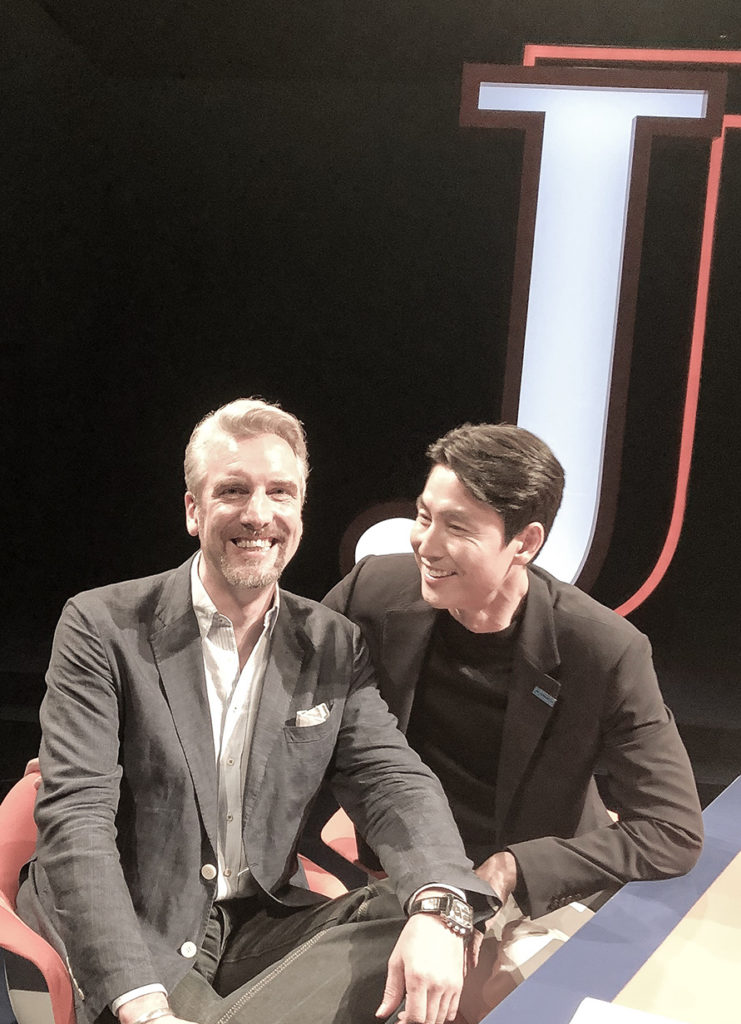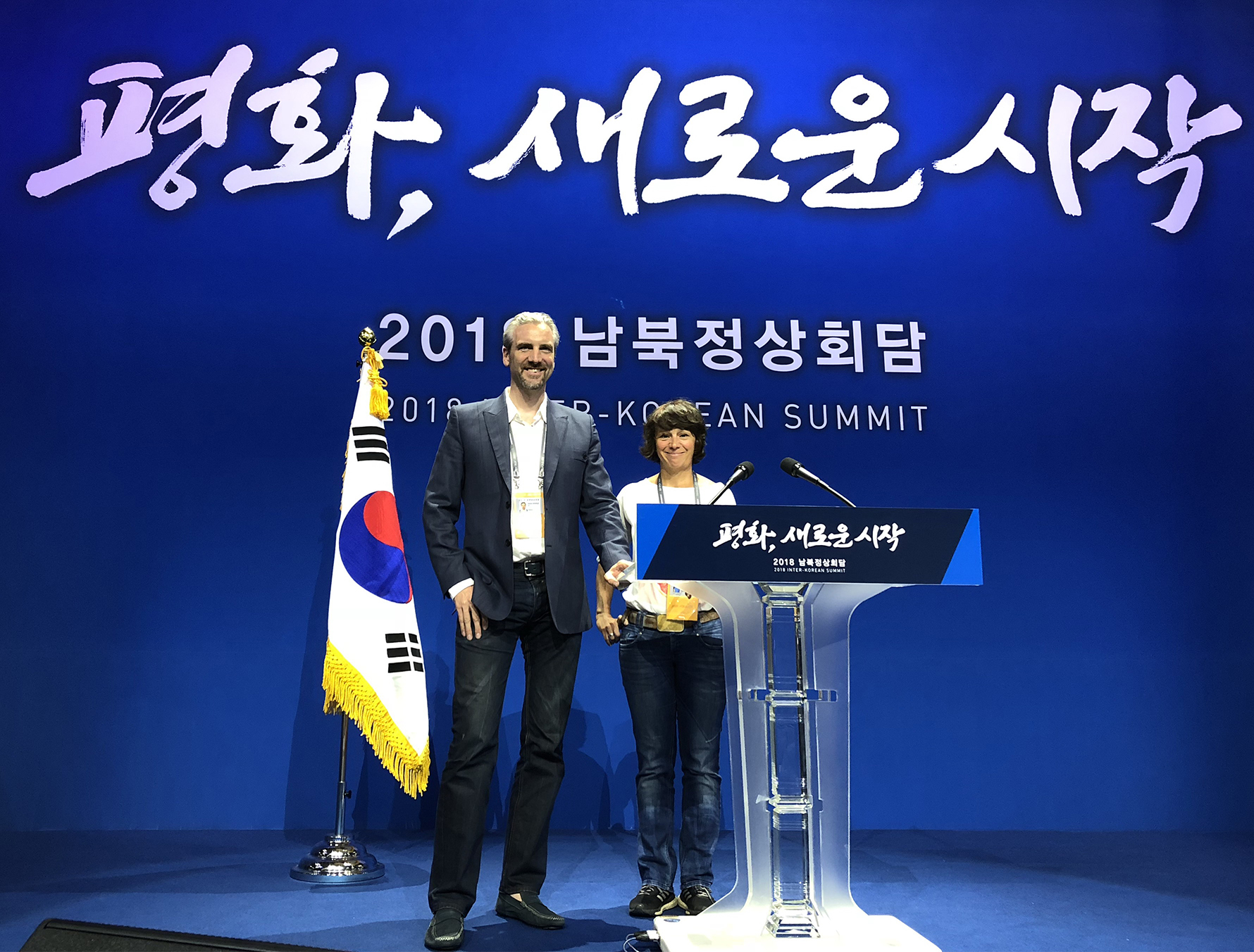Korea-Consult: Bringing Continents Together
Interview with Anton Scholz.
Anton Scholz is not only a successful businessman but also a model of how somebody who dreams big can find a home in one of the most homogenous countries in the world. For more than 15 years, he has been working as a consultant, project manager, and translator for many major as well as medium- and smaller-sized companies that do business in or with Korea. Mr. Scholz founded Korea-Consult in 2001, starting with interpretation and consulting services to become one of the most esteemed and preferred companies in supporting international media, events, and projects across Korea. — Ed.
Gwangju News (GN): Thank you for taking the time to do this interview. First, please introduce yourself and tell us about your academic background. Also, please tell us about your first encounters with Gwangju and South Korea.
Anton Scholz: My name is Anton Scholz from Hamburg, Germany, and I first came to South Korea in 1994 as a student because I was practicing martial arts – taekwondo. I was very interested in oriental philosophy and the background of martial arts, not only the physical part but also the metaphysical part of it. Therefore, when I was introduced to a Zen monk in Germany by my taekwondo master and then invited by the former to come to Korea to practice Zen with him here, I accepted his invitation. At that time, I intended to stay for one year, but I ended up staying quite a bit longer. I have been in Asia, especially in Korea, since the mid-1990s, so by now I have about 20 years of living experience here. I work as a freelance journalist and I also run my own company, Korea-Consult, where we do international projects mostly between Germany and Korea, but also with many other countries like the U.S., France, Italy, and England.

GN: What made you choose to stay and do business here? Could you also tell us how you got started?
Anton Scholz: When I was studying at Hamburg University, where I graduated with a master’s degree in Korean and Japanese Studies, I met a Korean professor who later had a position here at Chosun University. She called to tell me about an open position in Gwangju as an assistant professor and asked if I was interested in it. Since I did not have a job offer at the time and the proposal sounded interesting, I thought, why not? I had only lived in Seoul until then, so I took the job intending to come down to Gwangju for a year or two, but I ended up holding that teaching position for seven or eight years. Eventually, I quit in order to move on to a more creative line of work – my company.
GN: What are the main projects or services that Korea-Consult is involved in? More recently, how has your company been affected by COVID-19?
Anton Scholz: We work for foreign companies that have no permanent representation here (no local office or staff) and come only for short-term projects either because they have business partners here or because they have events, such as sporting events or trade fairs, or some kind of joint venture or cooperation here. They need local support, people who can speak Korean and help them get stuff done and, often, because traveling between Europe and Korea, or America and Korea, takes time. It is very helpful and saves them a lot of time and money if somebody, on their behalf, is looking after their interests. This is the kind of activity that Korea-Consult does.

COVID-19 has heavily affected our company because we deal with international business, and this market has been greatly curtailed. Currently, there are no foreigners coming to Korea, so all the business we do with delegations is down to zero. Many companies are rethinking their global strategies because they have been hit by the coronavirus and now are trying to reduce costs. I am also heavily impacted by COVID-19, so I am just praying that it will be over sooner rather than later.
GN: Given the loss of business these days, are there any other projects that you are involved in beside those of Korea-Consult?
Anton Scholz: I also work as a freelance journalist and worked for ARD German Television for eleven years as a local producer in Korea, in addition to other media outlets. I am also a correspondent for Weltreporter, which is the largest German network of freelance correspondents. This is my main side profession, though at Korea-Consult, we also produce film footage and similar stuff for media companies. Not only do we support these companies’ projects, but at times when it might be difficult to come to Korea, we also do the shooting part on their behalf. Moreover, we do commercial recordings for other companies, too. That has been quite interesting recently.
GN: Was it difficult to start a business here in Korea? What were the main obstacles you encountered?
Anton Scholz: It is not necessarily difficult to start a business, but it is difficult to be successful with it. The main obstacle is that Korea is still a very closed society in many ways. They are still not used to foreigners living and working here as equivalents to Koreans. We are only seen mostly as visitors who come here for a short time. There are quite a few obstacles when you want to set up your own company. For example, if you need bank loans, it is very complicated as a foreigner to get these. As a consequence, it is more difficult to start a company if you need financial backing. I set up my company only by selling my time and knowledge, and I did not need any major investment initially. I only started to hire personnel when I had so much work that I was not able to do it all by myself. Overall, the main obstacle is that Korean society has not fully accepted foreigners as part of society yet.

GN: What is the most memorable project you have worked on over the years?
Anton Scholz: The 2002 World Cup was a life-changing event for me because at that time it was my first big project for German television. It was incredible because I was able to support both Korea and Japan at the same time, and today I am still in contact with some of the people I met back then, after 18 years. It showed me that the skillset I have is valuable for big companies that come here and need support. When we got the PyeongChang Olympic Winter Games in 2018, I was a bit hopeful that it would provide a similar feeling, but sadly, even though I enjoyed my work for the Olympics, it provided nowhere near the same feeling I had back in 2002. Nowadays, everything has become a bit too bureaucratic. There are different people in charge now and everything is more controlled back in Germany.
GN: What are the main challenges in working with foreign and Korean companies at the same time?
Anton Scholz: For me, there is no challenge in working with both Korean and foreign companies at the same time. People are people no matter what country they are from, meaning the basic needs and problems are similar. I still think that Korean companies are not completely used to foreigners helping them in their own country. If Korea wants to become a more international society, it needs to accept that business projects that are multinational will be run in an international way and that the mindsets of foreign and Korean people are quite different, especially when it comes to business.
Therefore, if you do not have a person who is familiar with both Korean and the foreign language in use, as well as with ways of doing business in both cultures, then there is always a problem with communication. Actually, I have just gotten a new contract for intercultural coaching and support for a major company doing business with a development team in Germany. On account of communication difficulties with the Korean entity, they have hired me to help them. This is a good example of communication issues: For Koreans, it is sometimes a bit difficult to accept that they need support.
GN: How do you see the future of private businesses in the new world we live in? Do you think you will be affected a lot? Any advice for other local entrepreneurs?
Anton Scholz: At this stage, it is very difficult to say how things will turn out because we are not through the pandemic yet. But I do think that the pre-2020 world and post-2020 world will look different; I just do not know how big the change will be. Businesses will be affected, for sure. Some will thrive (delivery and online services, the medical field, etc.)

For foreign entrepreneurs in this time, I would say every crisis is also a chance. While a lot of companies might go bankrupt if they are in the wrong area, maybe some other companies, if they have good ideas, can see profits go through the roof with their start-ups in a very short period. They should just keep in mind that the pandemic will be over at some point, and if they are totally specialized in something that is only useful during the pandemic, they could be out of business as fast as they skyrocketed while the pandemic was ongoing.
Overall, even if is a difficult time, it is also an interesting and challenging one. I have always enjoyed a good challenge, and I hope that my company will come out of this stronger than it was before because we have ventured into new areas with a wider footprint than we had before coming into this crisis.
I think the same is true for South Korea also, because it has received a lot of international praise for handling the situation, despite once being the second most heavily infected country. It has now become a model case for many countries for how to effectively contain the virus. I hope that even though the Korean economy is heavily impacted at present, ultimately, we will emerge from this crisis stronger than before.

GN: Thank you, Mr. Scholz, for taking the time to provide us with this interesting and informative interview. We wish you and your business much future success.
Photographs courtesy of Anton Scholz.
The Interviewer
Melline Galani is a Romanian enthusiast, born and raised in the capital city of Bucharest, who is currently living in Gwangju. She likes new challenges and learning interesting things, and she is incurably optimistic. Instagram: @melligalanis




